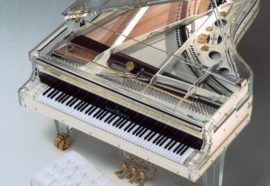Is it more important for students to learn to play from memory or sight reading? There are varied opinions depending on which music teacher you ask. This is more so for piano learners where performing classical pieces from memory is highly valued. But some music teachers feel that memorizing discourages students who want to learn music for the fun of it. What are the pros and cons of making your students memorize their recitals?
The case for memorization
- Confidence – Practice makes perfect. When a student gets the memorization right, he/she becomes very confident when it comes to performing. This is because the music is done from both mental and muscle memory, making the play smoother.
- Spontaneous performance – There are many instances where an instrument is available, but there is no sheet music. A student who has memorized a piece will perform regardless of the availability. This is more spontaneous and will claim the bragging rights in social events and other places where the student can perform to impress.
- Action performances – Unlike performing by reading sheet music where the student must concentrate on the chart, there is more flexibility for other actions when performing from memory. This is more so for instruments like the cello where the performer can add flair to the performance using dance movements.
- Rewarding hard work – Preparing for a recital by memorizing is hard work that can take weeks, or even months. When a student is able to successfully pull it off, it is an immensely gratifying experience that encourages him/her to pursue other music pieces with the confidence that they can be tackled as well.
- Better mental health- Like muscle function, the brain can also be trained to remember better. Participating in memorizations develops the student’s memory and mental function. This improves the performance of a student in other studies.
The case against memorization
- Limited skill – A student who can only perform from memory rather than reading music is able to play a limited variety of music. Developing music reading skills also enables a student to transit easily from one instrument to another.
- Less fun – For students who want to learn and start performing music in a short time, memorizing one piece over and over can be a bit dull and frustrating. This could discourage potentially good music students from pursuing music.
- Performance fails – It is very hard to recover from a memory glitch during a performance when all eyes are on the student. A failed recital can be devastating, making the student abandon music entirely.
The best approach would be a mix of reading and memorize. Students should first be able to read music competently, and then memorize it for smoother performances.
For more information Call or Text 832.594.7267 or maggie@chinesepianolady.net






